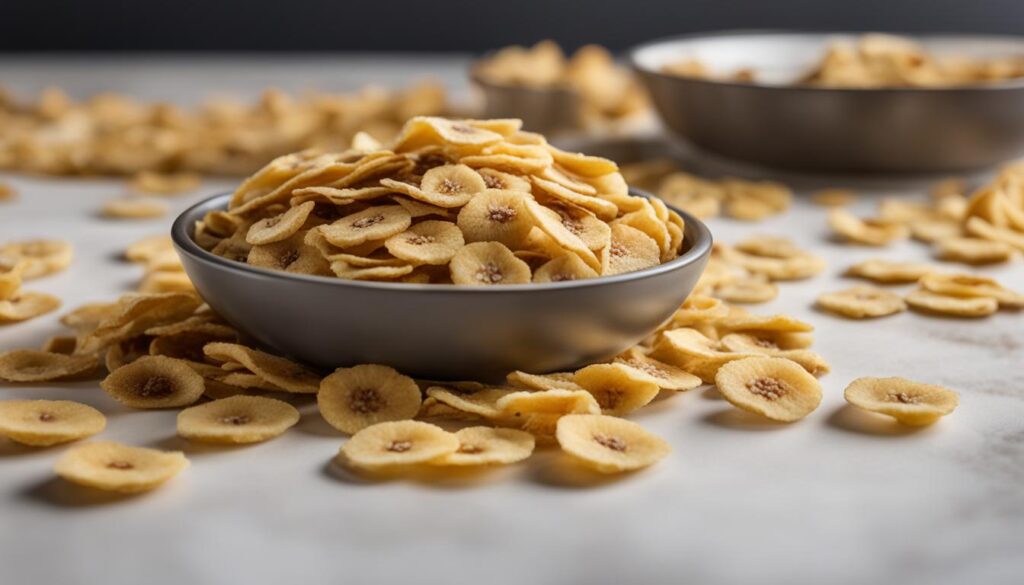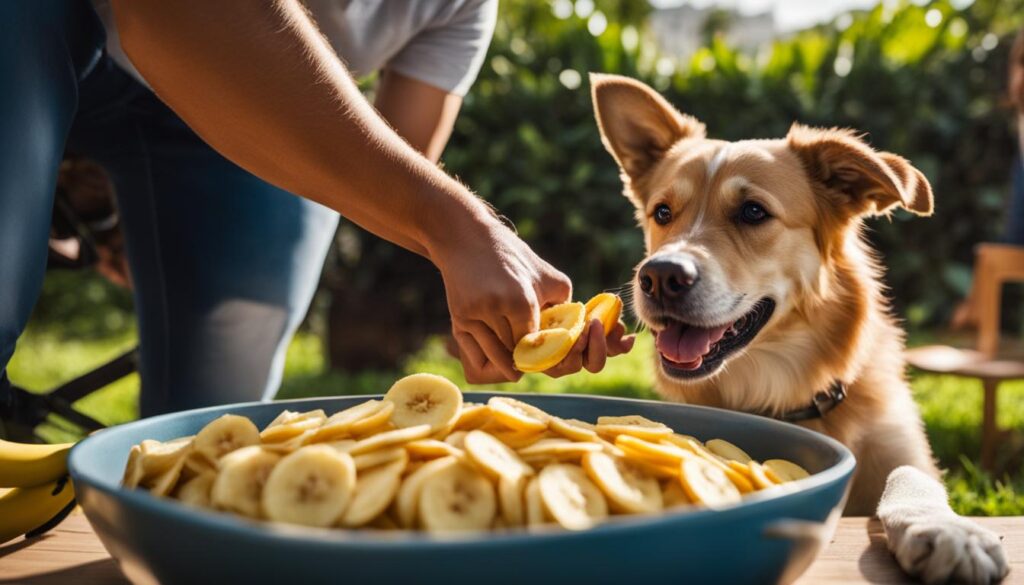When it comes to treating our beloved furry friends, it’s important to know which foods are safe and healthy for them. One popular snack that dog owners often wonder about is banana chips. Can dogs eat banana chips? Let’s find out.
Unlike other fruits that may contain toxic components, bananas are safe for dogs to eat. In fact, bananas offer several health benefits for our canine companions. They are packed with essential vitamins and minerals like magnesium, potassium, vitamin B6, and vitamin C. Additionally, bananas are rich in dietary fiber and low in cholesterol and fat.
However, it’s crucial to remember that bananas are also high in sugar and carbs. Therefore, they should be fed to dogs in moderation. Too many bananas can lead to diabetes, obesity, and stomach upset in dogs. Furthermore, some dogs may be allergic to bananas, so it’s essential to introduce them gradually and watch for any signs of allergies.
When it comes to banana chips, commercially available options often contain high levels of sugar and added preservatives. To ensure the health and safety of your furry friend, it’s best to dehydrate bananas yourself using a dehydrator or oven. This way, you can control the ingredients and avoid any potential harmful additives. Additionally, always consult your vet before adding bananas or any new food to your dog’s diet to ensure it aligns with their specific nutritional needs.
Key Takeaways:
- Bananas are safe for dogs to eat, but they should be fed in moderation due to their high sugar and carb content.
- Bananas offer health benefits for dogs, including essential vitamins, minerals, and fiber.
- Some dogs may be allergic to bananas, so it’s important to start with small amounts and monitor for any signs of allergies.
- Commercially available banana chips may contain high levels of sugar and added preservatives, so it’s best to dehydrate bananas yourself.
- Always consult with your vet before adding bananas or any new food to your dog’s diet to ensure it’s suitable for their specific needs.
Are Bananas Good for Dogs?

Bananas are not only delicious for humans but also offer numerous health benefits for our furry friends. These yellow fruits are packed with essential vitamins and minerals that can contribute to the overall well-being of dogs.
One of the key nutritional benefits of bananas is their rich potassium content. Potassium plays a vital role in maintaining healthy muscles and nerve function in dogs. It also helps regulate blood pressure levels, ensuring optimal cardiovascular health. Additionally, bananas are a great source of magnesium, which promotes bone strength and plays a crucial role in enzyme function.
Bananas are also rich in vitamins, including vitamin B6 and vitamin C. Vitamin B6 supports cognitive function, helping dogs stay alert and focused. Vitamin C, on the other hand, is an immune-boosting vitamin that can enhance dogs’ resistance to common illnesses and infections.
Furthermore, bananas are an excellent source of dietary fiber. Fiber aids in digestion and can help regulate bowel movements in dogs, promoting a healthy digestive system. It also supports the growth of beneficial gut bacteria, contributing to improved gut health in dogs.
Overall, the health benefits of bananas for dogs are undeniable. However, it’s important to feed bananas in moderation. While bananas offer numerous vitamins and minerals, they also contain sugar and starch. Feeding too many bananas can lead to weight gain, diabetes, or other health issues. Additionally, each dog has unique dietary needs, so it’s always advisable to consult with a veterinarian before introducing bananas or any new food into your dog’s diet.
Remember to consider your dog’s size, age, and overall health when determining the appropriate banana portion size. Too much of a good thing can have adverse effects, so it’s crucial to strike the right balance when incorporating bananas into your dog’s diet.
So, if you’re looking for a tasty and nutritious treat to share with your four-legged companion, consider offering them a slice of banana. Just be sure to do so in moderation and as part of a well-balanced canine diet.
Key Vitamins and Minerals in Bananas for Dogs
| Vitamins | Minerals |
|---|---|
| Vitamin B6 | Potassium |
| Vitamin C | Magnesium |
Are Bananas Bad for Dogs?

While bananas can be beneficial for dogs, it’s important to be aware of the potential risks associated with feeding them to your furry friend.
Bananas are high in sugar and starch, which can lead to health issues if consumed in excessive amounts. Dogs that consume too many bananas may be at risk of developing diabetes or obesity. It’s crucial to feed bananas in moderation to prevent these conditions.
Another factor to consider is that some dogs may be allergic to bananas. It’s recommended to start with small amounts and closely monitor your dog for any signs of an allergic reaction, such as sneezing, coughing, difficulty breathing, hives, or itching. If your dog exhibits any of these symptoms after consuming bananas, it’s essential to discontinue feeding them and consult with your veterinarian.
In addition, dogs with diabetes or kidney issues should avoid bananas due to their high sugar and potassium content. These conditions can be exacerbated by the consumption of bananas, so it’s best to consult with your vet before incorporating them into your dog’s diet.
It’s also worth noting that banana peels are not toxic to dogs; however, they can be difficult to chew and digest. Ingesting banana peels can pose a choking hazard and may lead to intestinal blockage. If you suspect your dog has consumed a banana peel and shows signs of gagging or choking, closely monitor their bowel movements and seek veterinary help if the peel is not passed within a few days.
Here is an illustration summarizing the risks of feeding dogs bananas:
| Risks of Feeding Dogs Bananas | Precautions |
|---|---|
| High sugar and starch content | Feed in moderation |
| Potential allergic reactions | Start with small amounts and monitor |
| Risks for dogs with diabetes or kidney issues | Consult with a vet before incorporating bananas into the diet |
| Choking hazard of banana peels | Avoid feeding banana peels to dogs |
Remember, the health and well-being of your dog should always be a top priority. If you have any concerns or questions about feeding bananas to your dog, it is best to consult with your veterinarian.
Can Dogs Eat Banana Peels?

Banana peels are not toxic to dogs, but they can be difficult to chew and digest. While dogs may be tempted to eat banana peels due to their appealing smell, it’s important to be cautious. If a dog ingests a banana peel, it can pose a choking hazard and may lead to intestinal blockage.
If you suspect that your dog has eaten a banana peel and shows signs of gagging or choking, it’s crucial to closely monitor their bowel movements. In most cases, the peel will pass naturally within a few days. However, if the peel is not passed or if your dog experiences prolonged discomfort, it’s essential to seek immediate veterinary assistance.
Can Dogs Eat Dried Banana Chips?
Dried bananas, also known as banana chips, can be a convenient and tasty snack for dogs. They provide a quick energy boost and contain essential nutrients. However, commercially available banana chips may not be the best choice for your furry friend. These chips often contain high levels of sugar and added preservatives, which can be harmful to dogs’ health.
To ensure the safety and quality of dried bananas for your dog, it’s best to make them at home. Homemade dried bananas offer a healthier alternative as they are free from added sugars and preservatives. Here’s a simple way to make homemade dried bananas for your pup:
- Step 1: Choose ripe bananas that are not overripe. Ripe bananas are easier to slice and dehydrate properly.
- Step 2: Peel the bananas and slice them into thin, even slices.
- Step 3: Preheat your oven to the lowest temperature setting, typically around 175°F (80°C).
- Step 4: Arrange the banana slices in a single layer on a baking sheet lined with parchment paper.
- Step 5: Place the baking sheet in the preheated oven and bake for about 2-3 hours, or until the banana slices are dehydrated but still slightly soft.
- Step 6: Once the banana chips have cooled, store them in an airtight container. They can be kept at room temperature for up to a week, or you can refrigerate them for longer shelf life.
By dehydrating bananas at home, you can ensure that your dog gets a healthier and safer version of dried banana chips. This way, you can control the ingredients and provide a natural, nutritious treat for your canine companion.

Health Benefits of Homemade Dried Bananas for Dogs
Homemade dried bananas retain the nutritional benefits of fresh bananas while offering a convenient and long-lasting snack for your dog. Here are some of the health benefits of homemade dried bananas:
Nutrient Benefits Vitamin C Boosts immune system Potassium Supports heart and muscle function Vitamin B6 Aids in brain and nervous system function Dietary Fiber Promotes healthy digestion Antioxidants Helps fight against free radicals These nutrients contribute to your dog’s overall health and well-being. However, it’s important to remember that dried bananas, just like fresh bananas, should be fed in moderation. Excessive consumption can lead to digestive issues or an imbalance in your dog’s diet.
It’s always a good idea to consult with your veterinarian before introducing any new food or treat into your dog’s diet. They can provide insights tailored to your dog’s specific needs and help you make informed decisions about their nutrition.
“Homemade dried bananas offer a healthier alternative as they are free from added sugars and preservatives.”
So, the next time you’re looking for a tasty and nutritious treat for your furry friend, consider making homemade dried bananas. They’re a simple and safe option that can be enjoyed by dogs of all sizes and breeds.
Remember to always prioritize your dog’s health and well-being by providing them with a balanced and varied diet. Treats should be given in moderation and should never replace the nutritional value of a complete and balanced meal.
For more information on feeding dogs bananas and other related topics, continue reading the rest of our article.
Can Dogs Eat Banana Bread?

While bananas themselves are safe for dogs, it’s important to be cautious when it comes to feeding them banana bread. Banana bread typically contains additional ingredients that may not be suitable or safe for dogs.
One of the main risks of banana bread for dogs is the presence of toxic ingredients. Some banana bread recipes include chocolate chips or raisins, both of which are toxic to dogs and can cause serious health issues if ingested. Chocolate can be toxic to dogs due to a compound called theobromine, while raisins and grapes can lead to kidney failure.
Another consideration is the high sugar content in banana bread. Most banana bread recipes include sugar or sweeteners, which can be harmful to dogs if consumed in excessive amounts. Dogs are not designed to process large amounts of sugar, and excessive sugar intake can lead to weight gain, dental problems, and even diabetes.
If you’re considering giving your dog banana bread, it’s crucial to check the ingredient list and ensure it doesn’t contain any harmful ingredients like chocolate or raisins. Additionally, moderation is key when it comes to feeding dogs any baked goods that contain sugar. It’s best to view banana bread as an occasional treat rather than a regular part of your dog’s diet.
Can Dogs Eat Banana Bread? Risks of Banana Bread for Dogs Yes, in moderation and without toxic ingredients like chocolate or raisins. – Chocolate chips or raisins can be harmful to dogs.
– High sugar content can lead to weight gain and other health issues.How to Safely Feed Your Dog Bananas

Before feeding your dog bananas, it’s important to consult with your vet. They will be able to advise you on the right amount of bananas for your dog based on their age, size, weight, and dietary needs.
If your vet approves adding bananas to your dog’s diet, there are several ways to safely feed them. You can offer fresh banana slices, either plain or frozen for a refreshing treat. Mixing bananas with other dog-safe ingredients like yogurt and peanut butter can be a tasty option.
You can also incorporate bananas into homemade treats by mixing them with oats and peanut butter or stuffing them into a dog toy and freezing them for a cool snack.
- Consult with your vet to determine the appropriate amount of bananas for your dog.
- Offer fresh banana slices as a snack or mix them with other dog-safe ingredients.
- Consider incorporating bananas into homemade treats.
By following these guidelines, you can safely introduce bananas into your dog’s diet and provide them with a nutritious and delicious treat.
Alternatives to Banana Dog Treats
If your dog doesn’t enjoy the taste of bananas or you’re looking for alternative treats to diversify their diet, there are plenty of other fruits and vegetables that are safe for dogs when consumed in moderation. Here are some dog-friendly alternatives to banana treats:
- Watermelon: This juicy fruit is a tasty and hydrating snack for dogs, as it contains a high water content that can help keep them cool on warm days.
- Apples: Apples are a great source of vitamins A and C, as well as dietary fiber. Be sure to remove the seeds and core before offering them to your dog.
- Strawberries: These sweet berries are packed with antioxidants and are a good source of vitamin C. Dogs can enjoy strawberries in small amounts, but be mindful of the sugar content.
- Cucumbers: Cucumbers are low in calories and high in hydration, making them a refreshing treat for dogs. Cut them into small, bite-sized pieces for easy consumption.
- Potatoes: Cooked plain potatoes can be a safe and satisfying treat for dogs. Avoid seasoning them with salt, butter, or oil, as these can be harmful to your furry friend.
When introducing new fruits or vegetables to your dog’s diet, it’s important to research and ensure that they are safe and suitable for your dog’s specific dietary needs. Additionally, it’s crucial to introduce new foods slowly and in moderation to prevent any potential digestive issues or allergic reactions.
Remember to consult with your veterinarian before making any significant changes to your dog’s diet to ensure that their nutritional needs are being met. Providing a variety of healthy and dog-friendly treats can help keep your furry friend happy and satisfied.
Key Takeaways
When it comes to feeding dogs bananas and banana chips, there are a few key takeaways to keep in mind:
- Feed in moderation: Bananas can be a healthy addition to your dog’s diet, but they should be given in moderation. The high sugar and carb content of bananas means that excessive consumption can lead to diabetes and obesity. It’s best to offer bananas as an occasional treat rather than a regular part of their meals.
- Monitor for adverse reactions: While most dogs tolerate bananas well, some may have allergies or sensitivities. Start by giving your dog small amounts of banana and monitor for any signs of allergic reactions, such as itching, digestive upset, or difficulty breathing. If you notice any adverse reactions, discontinue feeding bananas and consult with your veterinarian.
- Remove the peel: Banana peels are not toxic to dogs, but they can be difficult to chew and digest. It’s best to remove the peel before offering bananas to your dog to prevent any choking hazards or digestive issues.
- Consider homemade options: Commercially available banana chips often contain high levels of sugar and added preservatives, which may not be ideal for your dog’s health. Instead, consider making your own dried banana chips at home using a dehydrator or oven. This way, you can ensure that they are free from added sugars and preservatives.
- Consult with your vet: Before introducing bananas or any new food into your dog’s diet, it’s always a good idea to consult with your veterinarian. They can provide guidance on the appropriate portion sizes and frequency of feeding bananas based on your dog’s specific needs and health conditions.
By keeping these key takeaways in mind, you can safely incorporate bananas and banana chips into your dog’s diet as a healthy and occasional treat.
How Dog Insurance Can Help
When it comes to the health of our beloved furry friends, unforeseen circumstances can arise, resulting in expensive vet treatment costs. That’s where dog insurance can be a valuable resource and provide peace of mind. Dog insurance is designed to cover the financial burden of unexpected health issues that your dog may encounter. By investing in dog insurance, pet owners can significantly reduce the financial strain of veterinary care and ensure their pets receive the necessary treatment without compromise.
Dog insurance offers a range of benefits and coverage options that can be tailored to meet your dog’s specific needs. Here are some key advantages:
- Financial Protection: Dog insurance helps offset the cost of veterinary treatment, including diagnostic tests, medications, surgeries, and hospital stays. This can alleviate the financial burden and prevent difficult decisions based on budget constraints.
- Coverage for Illnesses: Dog insurance covers the cost of treating various illnesses that may afflict your furry companion, ranging from common ailments to more serious conditions. This ensures that your dog receives the necessary medical attention, regardless of the complexity or severity of the illness.
- Accident Coverage: Accidents happen, and they can result in significant veterinary expenses. With dog insurance, you can be confident that the costs associated with accidents, such as fractures, sprains, or ingestion of foreign objects, will be covered, allowing your dog to receive prompt medical care.
- Emergency Care: In times of emergency, quick and proper medical attention is crucial. Dog insurance provides coverage for emergency veterinary care, including hospitalization, emergency surgeries, and critical care, ensuring that your dog receives the necessary treatment when every minute counts.
- Additional Benefits: Dog insurance plans often offer supplementary benefits such as coverage for routine preventive care, vaccinations, spaying/neutering procedures, and dental treatments. These benefits can help maintain your dog’s overall health and well-being.
Choosing the right dog insurance plan is essential to ensure comprehensive coverage that meets your dog’s specific needs. Consider factors like premium costs, deductibles, coverage limits, waiting periods, and exclusions when selecting a policy. It’s also important to review the insurance provider’s reputation, claim settlement record, and customer reviews to make an informed decision.
Dog insurance provides peace of mind, knowing that you are prepared for unexpected health issues and can provide the best possible care for your furry friend. With the right insurance coverage, you can focus on your dog’s well-being without financial worries.
Remember, prevention is better than cure. While dog insurance can help cover unexpected health issues, prioritizing your dog’s health through a balanced diet, regular exercise, and routine veterinary check-ups can minimize the need for extensive medical treatments.
Now that we’ve explored the benefits of dog insurance, let’s move ahead and highlight some key takeaways in the final section.
Wrapping Up
In conclusion, feeding your dog banana chips can be a safe and enjoyable treat when done in moderation and with careful consideration. While bananas offer various health benefits, such as essential vitamins and minerals, they also come with risks due to their sugar and starch content. It is crucial to feed bananas to dogs in plain, unsweetened, and preservative-free form to minimize potential health issues.
It is always recommended to consult with your veterinarian before incorporating banana chips or any new food into your dog’s diet, especially if your dog has existing health conditions or allergies. Your vet can provide personalized guidance based on your dog’s specific needs and help determine the appropriate portion size and frequency of banana chip consumption.
Remember, the overall health and well-being of your dog should be your top priority. If your dog does not enjoy the taste of bananas or experiences adverse reactions, there are plenty of alternative treats available that can provide similar nutritional benefits. With proper care and attention to your dog’s dietary needs, you can ensure that they enjoy a happy and healthy life.
FAQ
Can dogs eat banana chips?
Yes, dogs can eat banana chips, but it’s important to feed them in moderation and choose plain, unsweetened, and preservative-free options.
Are banana chips safe for dogs?
Banana chips can be safe for dogs when given in plain, unsweetened, and preservative-free form. Commercially available banana chips may contain high levels of sugar and added preservatives, so it’s best to dehydrate bananas yourself.
What are the health benefits of banana chips for dogs?
Banana chips are packed with essential vitamins and minerals like magnesium, potassium, vitamin B6, and vitamin C. They also offer dietary fiber and are low in cholesterol and fat. These nutrients provide benefits such as improved digestive health, regulated blood pressure levels, improved bone strength, improved cognitive function, and an immunity boost.
What are the risks of giving dogs banana chips?
While banana chips can be a convenient snack for dogs, they often contain high levels of sugar and added preservatives. Excessive consumption of banana chips can lead to diabetes and obesity in dogs. It’s important to feed them in moderation and choose plain, unsweetened options.
Are there alternatives to banana chips for dogs?
Yes, there are many other fruits and vegetables that are safe for dogs in moderate amounts. Some examples include watermelon, apples, strawberries, cucumbers, and potatoes. It’s important to research and ensure that any fruits or vegetables you offer to your dog are safe and suitable for their specific dietary needs.
Can dogs eat banana peels?
Banana peels are not toxic to dogs, but they can be difficult to chew and digest. If a dog ingests a banana peel, it can pose a choking hazard and may result in intestinal blockage.
Can dogs eat dried banana chips?
Yes, dogs can eat dried banana chips, but commercially available banana chips often contain high levels of sugar and added preservatives. It’s best to dehydrate bananas yourself using a dehydrator or oven to ensure they are free from added sugars and preservatives.
Can dogs eat banana bread?
Banana bread can be safe for dogs if it doesn’t contain any toxic ingredients like chocolate chips or raisins. Most banana breads also contain sugar, so moderation is key.
How should I safely feed my dog bananas?
Before feeding your dog bananas, it’s important to consult with your vet. They can advise you on the right amount of bananas for your dog based on their age, size, weight, and dietary needs. You can offer fresh banana slices, either plain or frozen for a refreshing treat. Mixing bananas with other dog-safe ingredients like yogurt and peanut butter can be a tasty option. You can also incorporate bananas into homemade treats by mixing them with oats and peanut butter or stuffing them into a dog toy and freezing them for a cool snack.
What are some alternatives to banana treats for dogs?
If your dog doesn’t like the taste of bananas or you’re looking for alternative treats, there are many other fruits and vegetables that are safe for dogs in moderate amounts. Some examples include watermelon, apples, strawberries, cucumbers, and potatoes. It’s important to research and ensure that any fruits or vegetables you offer to your dog are safe and suitable for their specific dietary needs.
What are the key takeaways for feeding dogs bananas and banana chips?
When feeding dogs bananas and banana chips, remember to do so in moderation, start with small amounts, monitor for any adverse reactions, and consult with your vet if your dog has any underlying health conditions. It’s important to prioritize your dog’s overall health and well-being by following professional guidance and considering alternative treats if your dog doesn’t like the taste of bananas.
How can dog insurance help with unexpected health issues?
Dog insurance can help offset the cost of veterinary treatment for unexpected health issues that your dog may encounter. It can cover a range of vet treatments, including allergy testing for food allergies and complete sick visits. It’s important to choose a pet insurance plan that fits your dog’s specific needs and provides comprehensive coverage for both routine and unexpected health issues.






